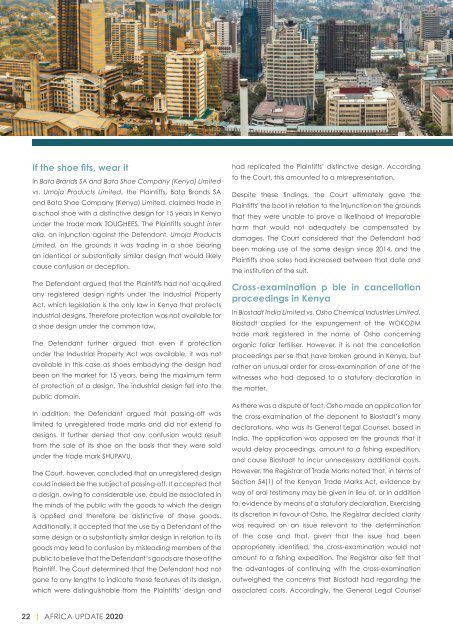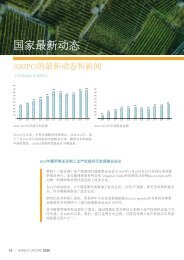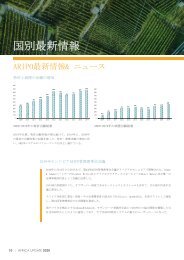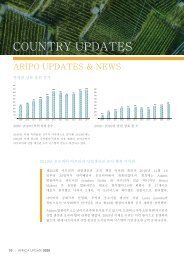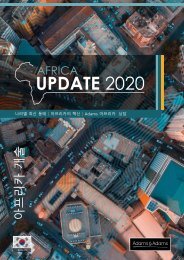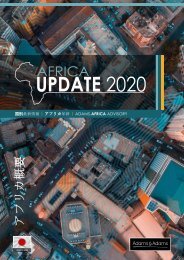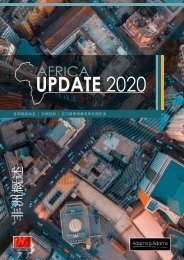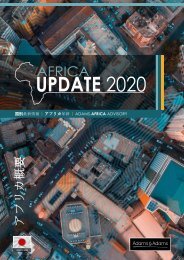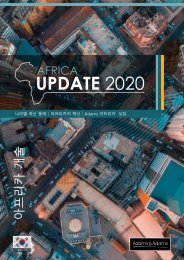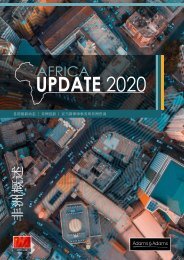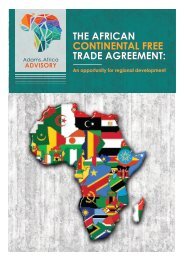Adams Advisory - Africa Update 2020
"Innovation inputs and outputs are still concentrated in very few economies; a global innovation divide persists”. Unfortunately, Africa is still depicted as the poor relation in the whole spectrum of innovation and Intellectual Property uptake. Read Adams & Adams' Advisory Insights into African investment opportunities.
"Innovation inputs and outputs are still concentrated in very few economies; a global innovation divide persists”.
Unfortunately, Africa is still depicted as the poor relation in the whole spectrum of innovation and Intellectual Property uptake.
Read Adams & Adams' Advisory Insights into African investment opportunities.
Create successful ePaper yourself
Turn your PDF publications into a flip-book with our unique Google optimized e-Paper software.
If the shoe fits, wear it<br />
In Bata Brands SA and Bata Shoe Company (Kenya) Limited<br />
vs. Umoja Products Limited, the Plaintiffs, Bata Brands SA<br />
and Bata Shoe Company (Kenya) Limited, claimed trade in<br />
a school shoe with a distinctive design for 15 years in Kenya<br />
under the trade mark TOUGHEES. The Plaintiffs sought inter<br />
alia, an injunction against the Defendant, Umoja Products<br />
Limited, on the grounds it was trading in a shoe bearing<br />
an identical or substantially similar design that would likely<br />
cause confusion or deception.<br />
The Defendant argued that the Plaintiffs had not acquired<br />
any registered design rights under the Industrial Property<br />
Act, which legislation is the only law in Kenya that protects<br />
industrial designs. Therefore protection was not available for<br />
a shoe design under the common law.<br />
The Defendant further argued that even if protection<br />
under the Industrial Property Act was available, it was not<br />
available in this case as shoes embodying the design had<br />
been on the market for 15 years, being the maximum term<br />
of protection of a design. The industrial design fell into the<br />
public domain.<br />
In addition, the Defendant argued that passing-off was<br />
limited to unregistered trade marks and did not extend to<br />
designs. It further denied that any confusion would result<br />
from the sale of its shoe on the basis that they were sold<br />
under the trade mark SHUPAVU.<br />
The Court, however, concluded that an unregistered design<br />
could indeed be the subject of passing-off. It accepted that<br />
a design, owing to considerable use, could be associated in<br />
the minds of the public with the goods to which the design<br />
is applied and therefore be distinctive of those goods.<br />
Additionally, it accepted that the use by a Defendant of the<br />
same design or a substantially similar design in relation to its<br />
goods may lead to confusion by misleading members of the<br />
public to believe that the Defendant’s goods are those of the<br />
Plaintiff. The Court determined that the Defendant had not<br />
gone to any lengths to indicate those features of its design,<br />
which were distinguishable from the Plaintiffs’ design and<br />
had replicated the Plaintiffs’ distinctive design. According<br />
to the Court, this amounted to a misrepresentation.<br />
Despite these findings, the Court ultimately gave the<br />
Plaintiffs' the boot in relation to the injunction on the grounds<br />
that they were unable to prove a likelihood of irreparable<br />
harm that would not adequately be compensated by<br />
damages. The Court considered that the Defendant had<br />
been making use of the same design since 2014, and the<br />
Plaintiffs shoe sales had increased between that date and<br />
the institution of the suit.<br />
Cross-examination p ble in cancellation<br />
proceedings in Kenya<br />
In Biostadt India Limited vs. Osho Chemical Industries Limited,<br />
Biostadt applied for the expungement of the WOKOZIM<br />
trade mark registered in the name of Osho concerning<br />
organic foliar fertiliser. However, it is not the cancellation<br />
proceedings per se that have broken ground in Kenya, but<br />
rather an unusual order for cross-examination of one of the<br />
witnesses who had deposed to a statutory declaration in<br />
the matter.<br />
As there was a dispute of fact, Osho made an application for<br />
the cross-examination of the deponent to Biostadt’s many<br />
declarations, who was its General Legal Counsel, based in<br />
India. The application was opposed on the grounds that it<br />
would delay proceedings, amount to a fishing expedition,<br />
and cause Biostadt to incur unnecessary additional costs.<br />
However, the Registrar of Trade Marks noted that, in terms of<br />
Section 54(1) of the Kenyan Trade Marks Act, evidence by<br />
way of oral testimony may be given in lieu of, or in addition<br />
to, evidence by means of a statutory declaration. Exercising<br />
its discretion in favour of Osho, the Registrar decided clarity<br />
was required on an issue relevant to the determination<br />
of the case and that, given that the issue had been<br />
appropriately identified, the cross-examination would not<br />
amount to a fishing expedition. The Registrar also felt that<br />
the advantages of continuing with the cross-examination<br />
outweighed the concerns that Biostadt had regarding the<br />
associated costs. Accordingly, the General Legal Counsel<br />
22 | AFRICA UPDATE <strong>2020</strong>


